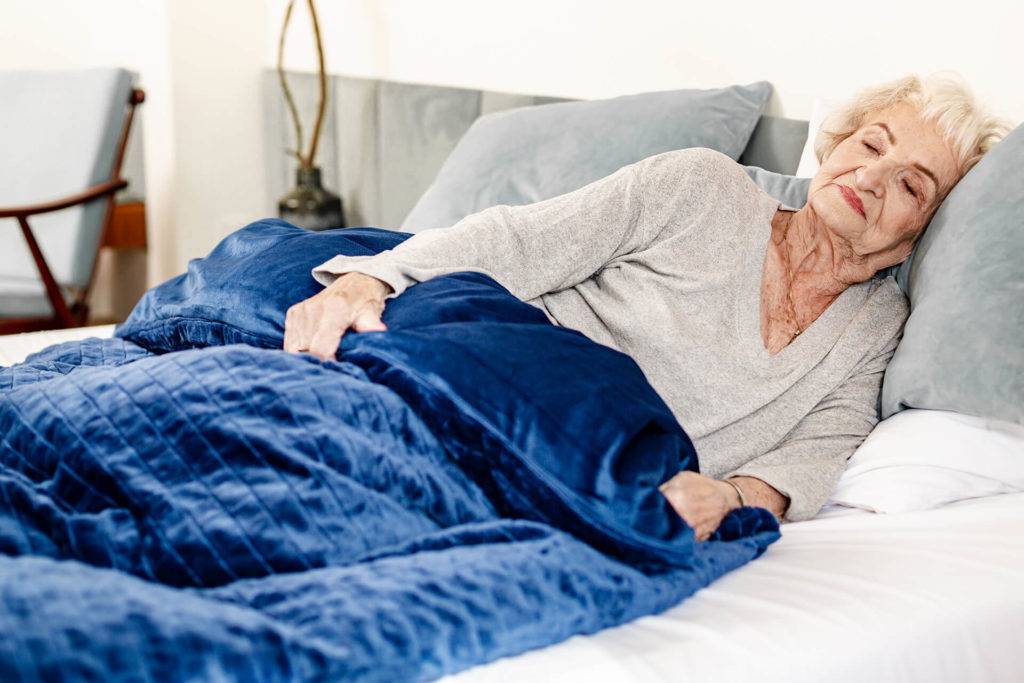
Depression in the elderly and the weighted blanket
Did you know that every 7th person over 60 suffers from depression? The Central Statistical Office reports that 20% of seniors suffer from depression. However, it is important to know that these figures are understated, as many patients do not report symptoms of this disease to doctors, believing that they are a result of advancing age. It is predicted that with the ageing of society, this ratio will increase alarmingly.
Depression in the elderly is a problem that is often overlooked or underestimated. Unfortunately, more and more seniors are struggling with this disease. Due to retirement, inactivity, and loneliness, the position of the elderly in society has changed drastically. Lack of contact with other people, the feeling of being unnecessary, deteriorating health, or decreased attractiveness cause seniors to give up associating with others, condemning themselves to loneliness, which results in depression.
The causes of depression in the elderly
Elderly people are exposed to apathy and depression because their lives have changed drastically: they are often widowed and isolated, and disease prevents them from functioning normally. All of this can lead to depression, which may become chronic in seniors.
Some neurological diseases contribute to depression in the elderly (e.g., Parkinson’s or Alzheimer’s disease). Seniors are also at risk of struggling with the loss of people close to them: grown children, partners, friends, or a beloved pet, which contributes to a lowered mood. Apart from psychogenic causes (the aforementioned life changes), there are also endogenous (genetic and metabolic disorders, etc.) and exogenous (i.e., symptoms caused by medications).
How do you recognize depression in the elderly?
It is necessary to observe seniors during various activities and pay special attention to symptoms such as:
- Sleep disorders
- Memory loss
- Impaired concentration
- Eating disorder
- Loss of satisfaction with life (anhedonia)
- Thoughts of resignation and suicide
- Somatic symptoms (resulting from mental disorders, not health problems, most often abdominal pain and headaches)
- Anxiety
When observing older people, you will notice that their activity in the morning is significantly reduced, and they are usually tired after a sleepless night. Therefore, they function much better in the afternoon or evening. An elderly person should be observed throughout the day to get a complete picture of the situation.
Most symptoms are treated as coexisting factors during the ageing process. However, this couldn’t be further from the truth. The quality of life of older people can be improved. Their greatest desire is to feel needed and loved. And, you can also take care of their sense of peace and security in another way.
Sleep and the weighted blanket in the elderly
Sleep disturbances cause chronic fatigue and irritability. Elderly people suffering from depression have trouble falling asleep, or their sleep is shallow or interrupted. So, upon waking, they feel exhausted and do not feel like doing any activities. You should take care of the quality of their rest. The weighted blanket provides a sense of security, a pleasant wrap, and makes it easier to fall asleep. It is the perfect solution for every senior! Specially selected materials ensure the right body temperature, even in people struggling with circulation problems and the notorious feeling of being cold. The weighted blanket supports the fight against depression in the elderly, raises their standard of living, and gives them the opportunity to properly relax and rest.
It is also important for the elderly to be able to enjoy the therapeutic qualities of the blanket during the day! They can easily put it on their legs while watching TV, reading books, or other forms of relaxation. The stimulation of deep feeling will give them a sense of security, peace, and harmony.
Let us provide our seniors with the best. They deserve a little luxury!
